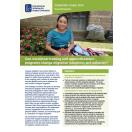Focus on Female Genital Mutilation
Female Genital Mutilation/Cutting (FGM/C) has negative health consequences for women, ranging from pain, bleeding, and shock due to chronic infections. Around 140 million girls and women live with the risks caused by FGM/C, of which 92 million girls and women are in Africa.
December 2012, 194 UN member states passed a resolution for intensifying the efforts to ban the practice across the globe.
The brief the key findings from a recent 3ie Systematic review Rigmor C. Berg and Eva Denison, on the effectiveness of interventions to tackle FGM/
Key findings
- FGM/C has proven health prevalence remains high in many countries.
- Changes in the law
are by enough. - Interventions that were not aligned with community needs, or did not involve religious leaders, suffered low attendance and drop outs.
- Educational sessions for men and women, including sessions on reproductive health for female university students, demonstrated an increase in awareness of the risks of FGM/C.




